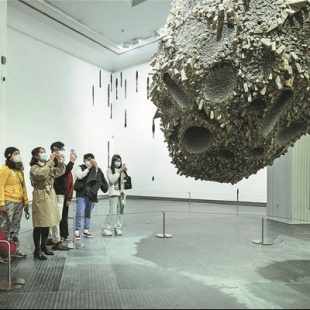Improving fortunes


Wang's description can be strongly felt in the section, Bumps on the Edges, which presents iconic local elements, such as factories, factory workers and commodities, and features lots of local artists.
The installation, Dreamy Lisa Salon, named after the fourth album of folk music band Wutiaoren, has become the triennial's star work. Groups of young visitors, mostly in their early 20s, come to the museum to take photos at the salon and share them on their social networks.
Starring guitarist Maotao and accordionist Renke, Wutiaoren from Guangdong province is one of the country's most popular folk-rock bands.
Their casual dress code with slippers and lyrics focusing on daily life won them tens of thousands of fans. The humidity in the air, narrow lanes, small restaurants and hair salons all inspire the band's songwriting.
The band works closely with a wide range of visual artists to produce music videos, posters and design works. Their signature logo is a red plastic bag with their name on it, a powerful symbol floating between popular culture and contemporary art. All these elements can be found in their installation, Dreamy Lisa Salon, inspired by a hair salon that was popular in Guangzhou in the 1990s.
Just like Wutiaoren, poet Xi Chuan and film director Jia Zhangke are also included in the contemporary show. All their art forms are seen as a crossover from popular culture to contemporary art.
Wu Hongliang, curator of the section, Bumps on the Edges, explains that after China's opening-up and reform in 1978, people's cultural demands started from their embracing pop music, films and poetry, and contemporary art is part of this.





































